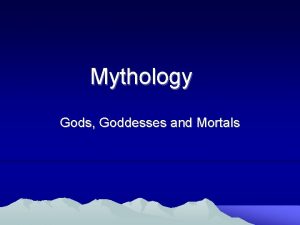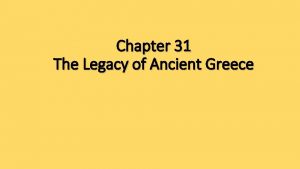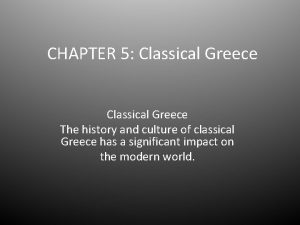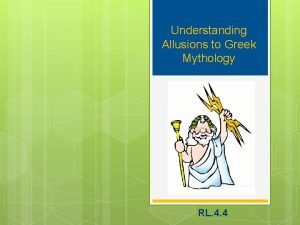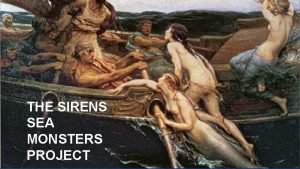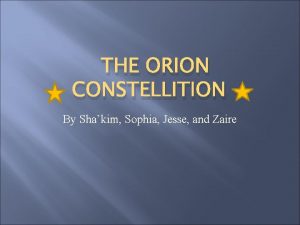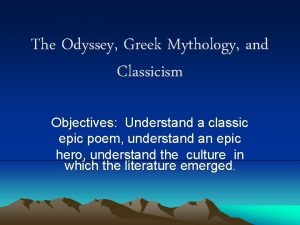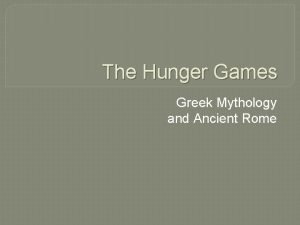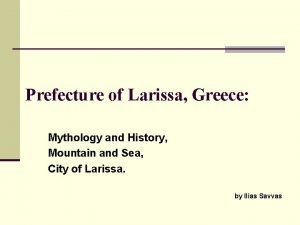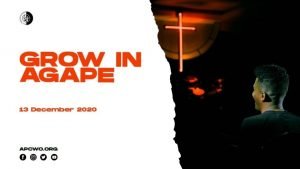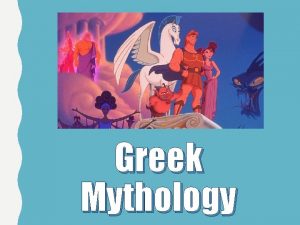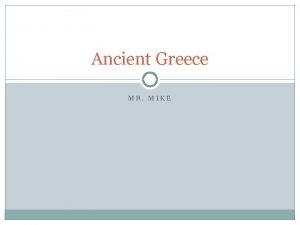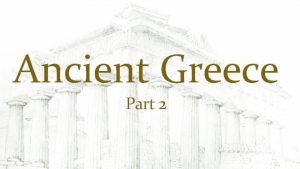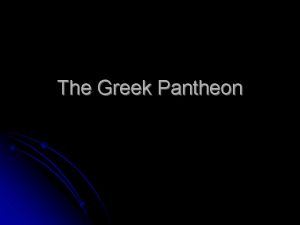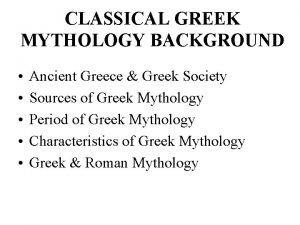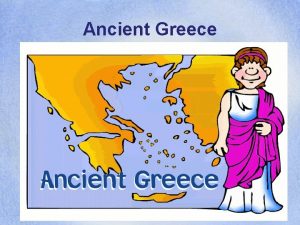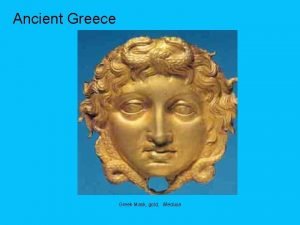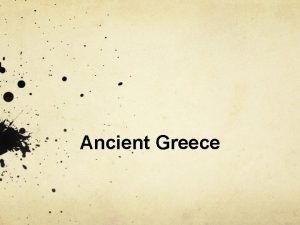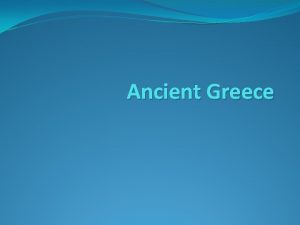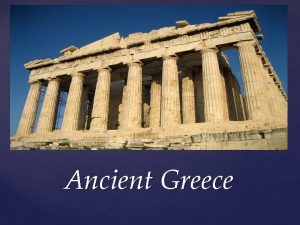Chapter 8 Ancient Greece Lesson 3 Greek Mythology













- Slides: 13

Chapter 8 – Ancient Greece Lesson 3 – Greek Mythology and Literature

Lesson 3 – Greek Mythology and Literature Words to Know Mythology Homer Sappho Aesop Fables

If You were there…. . As a farmer in Ancient Greece, your way of life depends on events in nature. The crops you grow need sunshine and rain, though thunder and lightening scare you. When you look up at the night sky, you wonder about the twinkling lights you see there. You know that at certain times of the year, the weather will turn cold and gray and plants will die. Than, a few months later, green plants will grow again. How might you explain these natural events?

Myths Explain the World The ancient Greeks believed in many gods. These gods were at the center of Greek mythology – a body of stories about gods and heroes that try to explain how the world works.

Greek Gods People today have scientific explanations for events like thunder, earthquakes and volcanic eruptions. The Ancient Greeks did not. The believed gods caused these things and created myths to explain them. Zeus, king of the gods Hera, queen of the gods Poseidon, god of the sea Hades, god of the underworld Demeter, goddess of the hearth Athena, goddess of wisdom Apollo, god of the sun Artemis, goddess of the moon Ares, god of war Aphrodite, goddess of love Hephaestus, god of metalworking Hermes, messenger god

Gods and Mythology The Greeks saw the work of gods in events all around them. The Greeks however did not think the gods spent all their time creating disasters. They also believed the gods caused daily events. Example: Demeter created the seasons To keep the gods happy, the Greeks built great temples to honor them all around Greece. In return, they expected the gods to give them help when they needed it.

Heroes and Mythology Not all Greek myths were about gods. Many told the adventures of great heroes. Some of which were real people. The Greeks loved to tell stories of heroes who had special abilities and faced terrible monsters. The people from Athens told stories about the hero Thesus. A legend who traveled from Crete to kill Minotaur, a terrible monster who was half human and half bull. The most famous of all Greek heroes was a man called Hercules. He too, fought many monsters and performed nearly impossible tasks.

Ancient Greek Literature Because Greeks loved myths and stories, they created great works of literature. They produced epic poems, romantic poetry and some of the world’s most famous stories. Among the earliest Greek writings are two great epic poems, the Iliad and the Odyssey, by a poet named Homer. Both poems describe great deeds done by great heroes, and those who fought in the Trojan War. Both are great tales of adventure and were essential parts to the Greek education system. Homer’s poems influenced later writers.

Lyric Poetry Other poets wrote poems that were often set to music. These poets were called lyric poets after their instrument, the lyre. Most poets in Greece were men, but the most famous lyric poet was a woman named Sappho. Most of her poems were about love and relationships with her family and friends.

Fables Other Greeks told stories to teach people important lessons. Aesop, for example is famous for his fables. Stories that teach readers lessons about life or gives advice on how to live. Animals were mostly his main characters. Example: Tale of the Ant and the grasshopper , The Tortoise and the Hare and The Boy who Cried Wolf.

Greek Literature Lives The words of ancient Greek writers such as Homer, Sappho and Aesop are still alive and popular today. Greek literature influenced modern language, literature and art. Many English words and expressions come from Greek mythology. Example: we call a long journey, an “odyssey” after Odysseus. Something very large and powerful is called “titanic” after the Titans – a group of large and powerful gods. Many places around the world today are also named after figures from Greek myths. Athens is named after Athena. Jupiter’s moon Io was named after a goddess’s daughter.

Literature and the Arts Greek myths have inspired artists for centuries. Great painters and sculptors have used gods and heroes as the subjects of their works. Hercules, for example, has been the subject of dozens of films. From early classics to Walt Disney Cartoon. Mythical references are also common in today’s popular culture. Many sports teams have adopted their names -- Titans or Trojans.

Let’s Review How did the Greeks use myths to explain the world around them? How do you think the modern Olympics are similar to the ancient Greek games? How do you think they are different? Why did the Greeks tell fables? How did Greek Myths influence later language and art?
 The greek miracle
The greek miracle The legacy of ancient greece chapter 31 answers
The legacy of ancient greece chapter 31 answers Legacies of ancient greece
Legacies of ancient greece Chapter 5 classical greece
Chapter 5 classical greece Greek mythology hierarchy
Greek mythology hierarchy Greek mythology
Greek mythology Facts about sirens
Facts about sirens Greek god orion
Greek god orion Greek mythology objectives
Greek mythology objectives What greek myth is the hunger games based on
What greek myth is the hunger games based on Greek mythology 100 arms
Greek mythology 100 arms Larissa mythology
Larissa mythology Storgē greek god
Storgē greek god Herophilus greek mythology
Herophilus greek mythology
